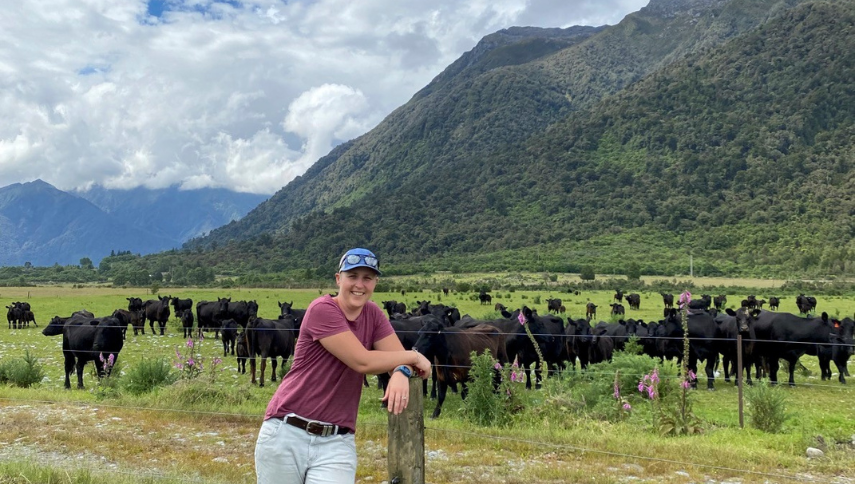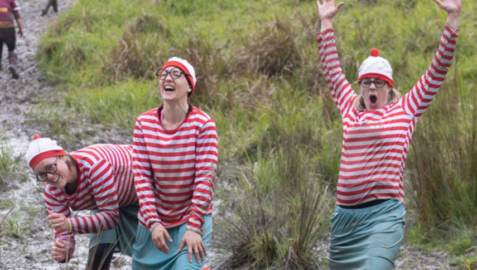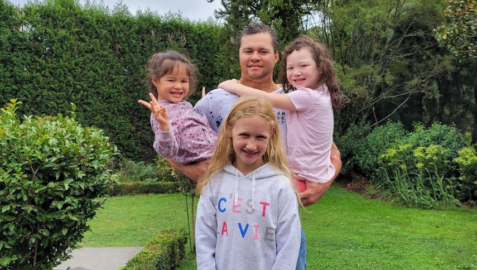
Going with the flow
Module Overview
Farm-raised Haley Pugh helped run a thriving chiropractic business in Hokitika, until cancer turned her life on its head. Farmstrong asked her to share what she’s learnt about coping with change and uncertainty.
Tell us about your background and connection to farming?
I grew up on a farm on the West Coast. I am sixth generation. It’s just a small family farm, 160 ha running 150 Angus cows and 100 Perrindale ewes. Enough to keep you busy. Ever since I was old enough to be useful, I’ve always worked for Dad, helping out with things like fencing and shearing. Dad and I were crutching ewes and lambs last week.
What do you like about farm life?
I just love that connection to the land and the freedom of being in the country – the solitude, the quiet, hearing the birds. I’ve travelled and lived in many other countries, but that’s always the place I go back to. On a farm you’re always out and about doing stuff. There’s something very satisfying about looking along a kilometre of fencing and seeing all the posts you’ve put in the ground.
You’ve had a pretty challenging time recently. Tell us about that.
Yes, I’ve hit a few speed bumps. I must’ve been going too fast! [laughs]. I was working as a chiropractor, had built up a decent patient base, life was looking pretty good. Then suddenly found a lump, got it checked and a week later I was diagnosed with breast cancer. After that it was ‘get on board the crazy train’ – MRI scans, surgical consultations, full body bone scans. Within six weeks I was in surgery. Since then, I’ve had 16 different rounds of chemo and radiation. That was about as fun as you can imagine.
Then I started getting back to normal, working rurally, labouring just to try and rebuild my fitness. But after a few months I started feeling tired again, got checked and discovered the ‘rust’ had come back and spread to my spine. That meant more rounds of chemo and immunotherapy every three weeks. Now I’ll never be cancer-free, but thanks to the wonders of modern technology there’s a good chance I’ll die with cancer, not of it.
That sounds an incredibly tough time.
Yes, as a woman, it felt like I’d almost lost everything that made me female – you lose the boobs, then the steroids blow you up like a balloon, then you lose all your hair. You feel like you’re getting kicked at every point.
How did you cope with all that? I think a lot of people will be interested in how you kept going mentally in the face of such major setbacks.
Well, I soon realised a lot of what was happening to me was completely out of my control. So instead, I just focused on what I could control – which was how I responded and reacted to the situation.
What did that look like? What adjustments did you make to your thinking?
I told myself, ‘ok, you can have a sulk, but once you’ve had it, you need to take steps and start living again.’ That was my mindset. I decided I wasn’t going to be a victim, so I asked myself, ‘what brings me joy?’ The big thing for me was getting back outdoors, back out in the weather – having a swim, a paddle, surf casting down the beach. I also loved getting back on farm and helping out, so I felt like I was contributing again.
A lot of people might go back into their shell in that situation. Did you share what you were going through with others?
You’re right, sometimes people don’t want to let their guard down, but connecting with others was massive for me. I can tell you that having a good yarn with someone and sharing your feelings is not only a sign of strength, it’s also very cleansing. I made sure I had plenty of people to talk to and I’ve always said to other people if you want to have a yarn give me a call. One of the benefits of living in a smaller area is that everyone knows everyone, and the bush telegraph works pretty well.
Farmers face a lot of uncertainty too. Do you think the things you’ve learnt are relevant?
Absolutely. In farming, you think you’re swimming along nicely and then the prices drop or there are challenging new regulations or a weather event. You’re constantly having to pivot and look at what you can do differently in farming. It’s a roller coaster.
Do you get a sense that rural communities are feeling ‘under the pump’ these days?
I think the last couple of years have been pretty mad for everyone, including farmers. I guess things like new regulations are a bit like having extra rocks in your backpack. You can keep going, but it all feels harder.
What can people do to maintain a good headspace? What have you found helpful?
Sometimes you just need to get off the rollercoaster for a bit, have a rest and make things a bit easier for yourself. Having pursuits outside of farming that you can look forward to, is good. My Dad’s into his shooting and heads off for competitions with a really good bunch of people. That’s a great way to get off farm and talk about things other than farming. I like fishing, paddling and getting into the outdoors.
What else has worked for you?
It’s good to keep up your strength and fitness. That gets your endorphins and feel-good hormones going and boosts your mood. It also sets you up for demanding seasons like calving. Having the fitness to get through busy periods is a big thing, so you’re making life easier for yourself and not burning yourself out at the start of a season.
Many farmers tell us they struggle with sleep. How do you stop waking up and worrying about things? Any tips?
I think the trick with worries is don’t let them spin round and round in your head – get them out of your head and write them down. For me, it’s as simple as having a notepad by the bed.
The other thing to remember is that you’re not in it alone. There’ll be other people feeling the same way. So, having a chat with someone is a great way to relieve stress. There’s a lot of wisdom in rural communities to tap into.
Looking back, what’s your biggest insight about coping with uncertainty?
Life doesn’t always work in a linear fashion. It takes twists and turns and sometimes you’ve just got to learn to go with the flow. You need to stay flexible in your thinking and be prepared to pivot. I’ve always been pretty good at going with the flow even when life’s sending me down a few rapids and bouncing me off the banks.
The past few years have also taught me that small changes in your thinking can make a big difference to how you feel. It’s a bit like when you get a flat tyre. You can either get grumpy and let it spoil your day or you can just get on with it, change the tyre and be on your way again. It’s about your attitude – how you react to a situation. That’s what you can control.
What’s up next for you?
A West Coast summer. Anything outside, and in all weather. There’s nothing like it.
Farmstrong is nationwide, rural wellbeing programme for farmers and growers. For free farmer-to-farmer tools and advice on how to cope with the ups and downs of farming, visit www.farmstrong.co.nz.


